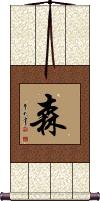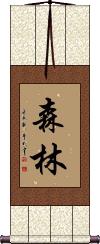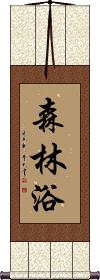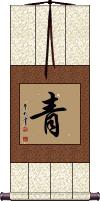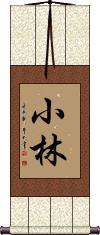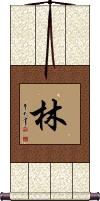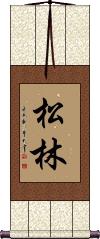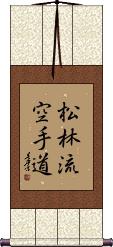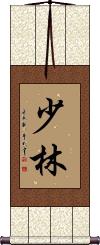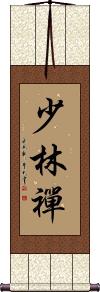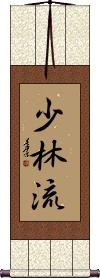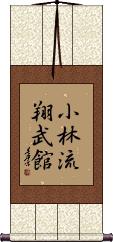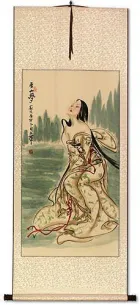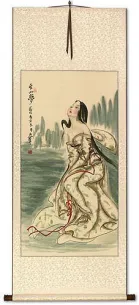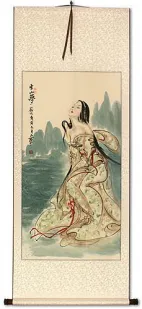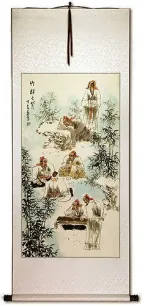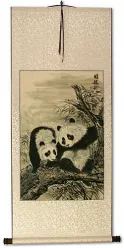Buy a wall scroll with Forest in Chinese or Japanese.
Learn how the name Forest is written in Chinese and Japanese. Decorate your home with a cool wall scroll that says Forest.
1. Forest
3. Furinkazan
4. Green
6. Lam
7. Lim
8. Lum
10. Matsubayashi-Ryu Karate-Do
11. Mountain Travels Poem by Dumu
12. Resilience / Restoration / Recovery
13. Shaolin
15. Shaolin Chan
16. Shaolin Disciple
17. Shobayashi-Ryu
19. Shorin-Ryu
21. Small Forest
Forest
Given Name
佛雷斯特 is the transliteration to Mandarin Chinese for the name Forest.
However, if your name is Forest, I suggest using the Chinese/Japanese/Korean word for forest (wooded area).
Forest
森 is the Chinese, Japanese Kanji, and old Korean Hanja for forest.
This can also refer to a dense forest-like place or thing. It can also refer to a shrine grove or sacred grove (a forest of religious significance).
Forest
Wooded Area
森林 is how to generically write “forest” or “woods” in Chinese, Japanese Kanji, and old Korean Hanja.
If you look at the first character, you will see that it is made up of three trees. The second is actually two trees. 森林 is one of those words that really visually expresses the meaning.
If your name is Forest, I suggest this title to represent your name.
Forest Bathing
森林浴 is the title for forest bathing or Shinrinyoku in Japanese and Senlinyu in Chinese.
This is simply the practice of spending time in a forest, often including walking or deep breathing as a form of therapy.
Also defined as forest therapy or a peaceful walk through the woods for health benefits.
Furinkazan
military strategy
風林火山 is the battle strategy and proverb of Japanese feudal lord Takeda Shingen (1521-1573 AD).
This came from the Art of War by Chinese strategist and tactician Sun Tzu (Sunzi).
You can think of this as an abbreviation to remind officers and troops how to conduct battle.
風林火山 is a word list: Wind, Forest, Fire, Mountain.
The more expanded meaning is supposed to be...
“Swift as the wind, quiet as the forest, fierce as fire, and immovable as a mountain”
“As fast as the wind, as quiet as the forest, as daring as fire, and immovable as the mountain”
“Move as swift as the wind, stay as silent as a forest, attack as fierce as fire, undefeatable defense like a mountain”
“Move swiftly like the wind, stay silent like the forest, attack fiercely like fire, take a tactical position on the mountain”
See Also: Art of War
Green
The fresh green of nature
青 is nature's color and can refer to forest green, greenish-blue, or the darkest of greens.
青 and color represent nature, youth, and young people.
In the same way, we refer to green bananas and the rookie being green, the same is true in Chinese and Japanese, where, in a certain context, this can mean immature, unripe, or young.
In Japan, this can also be a female given name “Haru.” It can also be used as a given name (for either sex) in China.
Kobayashi / Shobayashi
小林 means little forest in Japanese and Chinese.
This can also be the Japanese surname or martial arts style called Kobayashi or Shōbayashi.
In Japanese martial arts, this can also be pronounced as Shorin and is included as such in some MA school names.
This is the Vietnamese surname Lam in the original Chinese form.
Before Vietnam romanized, 林 was the way to write Lâm. This is also a surname in Chinese and the meaning is “small forest.”
林 is the Chinese character for the surname Lim.
The meaning is small forest.
林 is a surname in many dialects but with varying romanizations:
Lín (Mandarin)
Lam, Lum, Lem (Cantonese)
Hayashi (Japanese)
Lim (Thai)
Lâm (Vietnamese)
Ling (Eastern Min, Northern Min, Wu Chinese)
Lim, Liem (Min Nan or Hokkien, Teochew, Korean, Taiwanese Minnan, Indonesian)
林 is the Cantonese/Hakka name Lum.
林 has the meaning of small forest or orchard. There is another surname character, 藍, which can also romanizes as Lum with the meaning of blue or azure.
Pine Forest / Matsubayashi
松林 is a Japanese, Chinese, and Korean word that means pine forest.
Also, a Japanese surname that romanizes as Matsubayashi or Shorin/Shourin.
Matsubayashi-Ryu Karate-Do
鬆林流空手道 is the Japanese title for the Matsubayashi-Ryu Karate-Do school of martial arts.
If directly translated, it means “Pine Forest Style Empty Hand Way.”
Notes:
1. 松林流 can be pronounced Matsubayashi-Ryū or Shōrin-Ryū. This can be confusing as Shōrin can also represent 少林 which refers to the Shaolin (little forest) style.
2. 松 can also be written in the traditional form of 鬆.
Mountain Travels Poem by Dumu
This poem was written almost 1200 years ago during the Tang dynasty.
It depicts traveling up a place known as Cold Mountain, where some hearty people have built their homes. The traveler is overwhelmed by the beauty of the turning leaves of the maple forest that surrounds him just as night overtakes the day, and darkness prevails. His heart implores him to stop, and take in all of the beauty around him.
First, before you get to the full translation, I must tell you that Chinese poetry is a lot different than what we have in the west. Chinese words simply don't rhyme in the same way that English or other western languages do. Chinese poetry depends on rhythm and a certain beat of repeated numbers of characters.
I have done my best to translate this poem keeping a certain feel of the original poet. But some of the original beauty of the poem in its original Chinese will be lost in translation.
Far away on Cold Mountain, a stone path leads upwards.
Among white clouds, people's homes reside.
Stopping my carriage I must, as to admire the maple forest at nights fall.
In awe of autumn leaves showing more red than even flowers of early spring.
Hopefully, this poem will remind you to stop, and “take it all in” as you travel through life.
The poet's name is “Du Mu” in Chinese that is: ![]()
![]() .
.
The title of the poem, “Mountain Travels” is: ![]()
![]()
You can have the title, poet's name, and even “Tang Dynasty” written as an inscription on your custom wall scroll if you like.
More about the poet:
Dumu lived from 803-852 AD and was a leading Chinese poet during the later part of the Tang dynasty.
He was born in Chang'an, a city in central China and the former capital of the ancient Chinese empire in 221-206 BC. In present-day China, his birthplace is currently known as Xi'an, the home of the Terracotta Soldiers.
He was awarded his Jinshi degree (an exam administered by the emperor's court which leads to becoming an official of the court) at the age of 25 and went on to hold many official positions over the years. However, he never achieved a high rank, apparently because of some disputes between various factions, and his family's criticism of the government. His last post in the court was his appointment to the office of Secretariat Drafter.
During his life, he wrote scores of narrative poems, as well as a commentary on the Art of War and many letters of advice to high officials.
His poems were often very realistic and often depicted everyday life. He wrote poems about everything, from drinking beer in a tavern to weepy poems about lost love.
The thing that strikes you most is the fact even after 1200 years, not much has changed about the beauty of nature, toils, and troubles of love and beer drinking.
Resilience / Restoration / Recovery
恢復力 suggests having the power to recover, restore, and rehabilitate. This can refer to yourself, someone else, or even to something, like rehabilitating a burned forest. 恢復力 is the essence of resilience in life.
The first two characters are a word that means to reinstate, resume, restore, recover, regain, or rehabilitate, restoration, rehabilitation, recovery, return, improvement, recovery (from an illness), recuperation, or convalescence.
The last character means strength or power.
See Also: Tenacity | Perseverance
Shaolin
Little Forest
The 少林 or Shaolin monks of China have been practicing the art of Kung Fu for thousands of years. While there are many schools of Kung Fu in China, Shaolin are one of the more religiously devout and disciplined.
The title of Shaolin actually refers to a specific Buddhist monastery. It should be noted that the Shaolin were famous in China long before the Kung Fu TV show. Their fame in China is due to the monks' heroic and swift rescue of an emperor during the Tang Dynasty. Most Chinese people are not keenly aware of the Kung Fu TV show and have no idea who David Carradine is or anything about his character, Kwai Chang Caine.
Note: The literal meaning of 少林 is “little forest.”
The fame of the Shaolin has spread all over Asia, as even though this is a Chinese title, the same characters are used in Japanese with the same meaning.
Shaolin Chang Chuan
少林長拳 is a combination of two titles. The first two characters mean little forest, as in the little forest of the Shaolin monks (shao lin = little forest). The second two characters mean “long fist.”
This title is specific to a particular technique - if you are studying Shaolin Chang Chuan, then you are already aware of all the ramifications.
Shaolin Chan
少林禪 translates as “Little Forest Meditation.”
少林禪 is part of a movement to provide spiritual and mental health by integrating the practices of martial arts and meditation.
More information at Shaolin Chan Foundation.
Shaolin Disciple
少林弟子 means Shaolin Disciple in Chinese.
This could also refer to a Shaolin Practitioner or a Shaolin Monk.
Shobayashi-Ryu
This is the title Shōbayashi-Ryu in Japanese Kanji.
小 = small
林 = forest
流 = style / school / lineage
Shobayashi Shorin-Ryu
小林少林流 is the title Shobayashi Shorin-Ryu in Japanese Kanji.
Shōbayashi Shōrin-Ryū is of real Okinawan karate lineage, but the romanization causes confusion.
小林 = Shōbayashi (can also be read Kobayashi)
少林流 = Shōrin-Ryū (Shaolin style) which means “Small-forest Shaolin School.”
This reflects the lineage that uses 小林 (small forest) instead of 松林 (pine forest) or 少林 (Shaolin) as the branch identifier of the Okinawan martial arts style.
You should use this, 小林流 (Shōbayashi/Kobayashi-Ryū) or “Small-forest style” for the Chibana lineage.
You should use 松林流 (Matsubayashi-Ryū) or “Pine-forest style” for the Nagamine lineage.
Shorin-Ryu
Shaolin Style
少林流 is the Japanese martial arts title “Shorin-ryu.”
Though the first part of the title comes from the Shaolin (small forest) monks of China.
In Japan, this refers to the Okinawa School of Karate.
Shorin-Ryu Shobukan
小林流翔武館 is the title, Shorin-Ryu Shobukan meaning “Little Forest Style - Soaring Warrior House” in Japanese.
There is more than one version of Shorin-Ryu and Shobukan, so make sure the characters here match the ones used at your dojo.
Small Forest
林 refers to a small forest, a grove, a thicket, or the woods.
In Chinese, this can be the surname Lin. It's also the lin in Shaolin (referring to the monks of the Shaolin temple).
The symbology of this character is two trees side-by-side. Take a look, you can see the tree figures.
This in-stock artwork might be what you are looking for, and ships right away...

